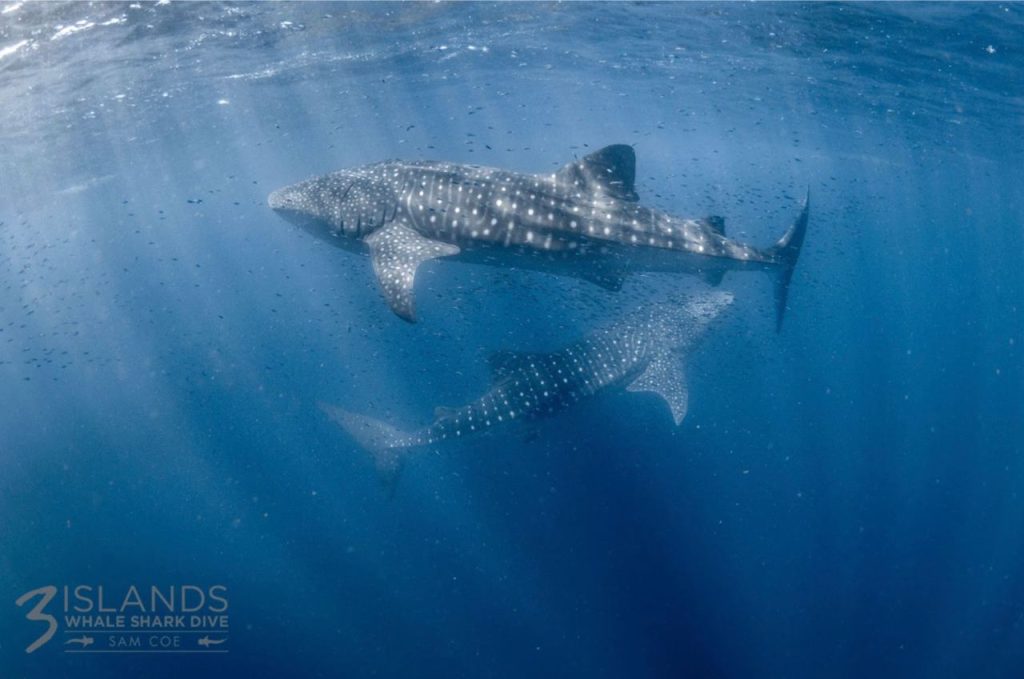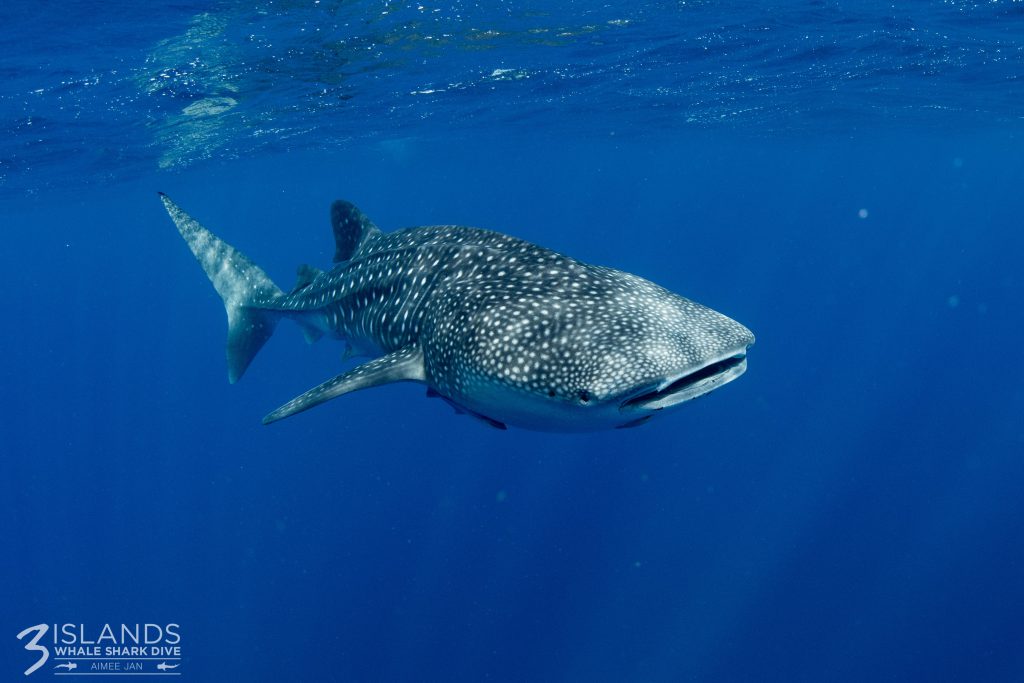Have you ever thought about what whale sharks, the biggest fish in the ocean, are really like?
Despite their huge size, there’s a lot we don’t know about them. These gentle giants are important to the ocean, but they keep many secrets that even experts are still trying to figure out. In this blog, we’re going to dive into five interesting whale shark facts that aren’t widely known. We’ll dive into their world and uncover some truly fascinating details about their lives. By the end, you’ll see whale sharks in a whole new light and understand why they’re such an important part of the ocean’s ecosystem.

Table of Contents
- Fact #1: Whale Sharks Have Unique Spot Patterns
- Fact #2: Whale Sharks Have Thousands of Tiny Teeth
- Fact #3: Whale Shark’s Long Lifespan & Late Maturity
- Fact #4: Whale Sharks Have Deep Diving Abilities
- Fact #5: Whale Sharks are Global Migrators with a Home-Returning Habit
- Experience the Wonder of Whale Sharks in Exmouth
Fact #1: Whale Sharks Have Unique Spot Patterns
One of the most fascinating whale shark facts is their unique spot patterns. Just like every person has their own fingerprint, every whale shark has its own special pattern of spots and stripes. Marine biologists use these patterns near their pectoral fins and behind their gill slits to tell whale sharks apart, which is crucial for tracking their movements and studying their behaviours.
If you're curious to see these patterns for yourself, there's no better way than going on a whale shark tour in Exmouth. Joining a tour with Three Islands Whale Shark Dive offers a once-in-a-lifetime opportunity to swim alongside these gentle giants and witness their stunning spot patterns up close.
Whether you're snorkelling beside them or observing from the boat, the intricate designs of their spots are a breathtaking sight. This hands-on experience is far beyond what you'd get from pictures online or aquarium visits, providing a direct connection to the wonders of the natural world.
Fact #2: Whale Sharks Have Thousands of Tiny Teeth

Among the interesting facts about whale sharks is their thousands of tiny teeth. You might think that with around 3,000 teeth, these giants would be fierce predators. However, those tiny teeth don’t play a big part in their eating habits. Instead of using their teeth, whale sharks feed by filter-feeding, which is like sieving their food from the water. They open their massive mouths to take in water filled with plankton and small fish, then push the water out through their gills, trapping the food inside.
This feeding method is pretty unique and shows how not all sharks are the bite-first types you might imagine. So, even with thousands of teeth and hundreds of rows, whale sharks remain gentle giants of the sea, relying on tiny organisms in the water to get their nutrients. It’s a fascinating contrast that highlights the diverse ways marine creatures have adapted to survive in the ocean.
Fact #3: Whale Shark’s Long Lifespan & Late Maturity
A crucial whale shark fact for conservationists is their long lifespan and late maturity, underscoring the need for protection. Whale sharks can live for over 100 years, but they don’t reach adulthood until they’re about 25 to 30 years old. This slow journey to maturity means whale sharks have fewer opportunities to reproduce over their lifetimes, which is a big deal for their conservation.
In places like Exmouth, a renowned hub for whale shark tourism in Australia, marine biologists study these aspects closely. The information gathered here helps experts understand how to better protect whale sharks. Since they take so long to mature, protecting young whale sharks and ensuring they reach adulthood is crucial for maintaining healthy populations.
This long growth period before reaching sexual maturity highlights why it’s so important to protect their habitats and minimise threats. Every whale shark that reaches adulthood can contribute significantly to the survival of their species, making conservation efforts in places like Exmouth vital.
Fact #4: Whale Sharks Have Deep Diving Abilities
Despite their massive size, whale sharks are known to dive to depths of over 1,900 metres (about 6,200 feet). What makes these deep dives even more fascinating is that marine biologists are still trying to fully understand why they do it. Some theories suggest that whale sharks dive deep to find food or to navigate, but the exact reasons remain a part of the ocean’s many mysteries.
Their ability to plunge into the deep dark waters of the ocean highlights the complexity and adaptability of whale sharks. It also poses unique challenges for researchers studying these creatures, as following them into such depths is no easy task.
Fact #5: Whale Sharks are Global Migrators with a Home-Returning Habit
The migration patterns and homing behaviour of whale sharks rank as some of the most fascinating facts about these gentle giants. Whale sharks traverse thousands of kilometres across the oceans, yet they consistently return to the same feeding grounds annually. This behaviour underscores the importance of specific habitats for their survival and aids conservation efforts by identifying critical areas needing protection. Tracking studies have shown whale sharks’ loyalty to regions like Ningaloo Reef and Yucatán Peninsula, highlighting their remarkable navigational skills and the ecological significance of their migratory habits.
Experience the Wonder of Whale Sharks in Exmouth

More...
Whale Shark Breeding Facts
Whale sharks present a fascinating mystery that intrigues marine biologists and ocean lovers alike. These giant fish, known for their peaceful nature and filter-feeding habits, navigate the warm seas with a grace that belies their immense size Table of Content What is Known About Whale Shark Reproduction? How Many Pups Do Whale Sharks Have? How…
Whale Shark: Whale or Shark?
The whale shark (Rhincodon typus) stands as a majestic giant in the marine world. They possess a unique blend of characteristics that blur the traditional lines between the mammoth, filter-feeding whales and their more ferocious shark cousins. In this exploration, we’ll look into the intriguing world of whale sharks, unravelling the mysteries of their nature,…




